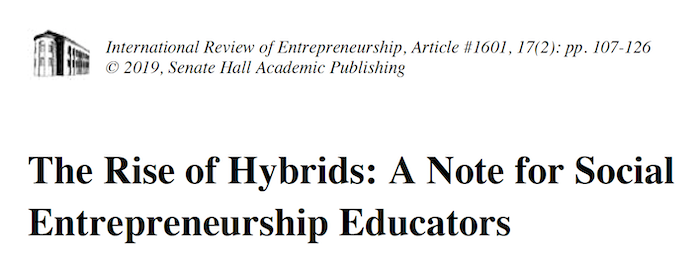The Rise of Hybrids: A Note for Social Entrepreneurship Educators is a new paper written by ranchers and educators from Belgium and USA emphasizing the lack of focus on hybrid organizing when teaching and training social entrepreneurs.
Social entrepreneurship mix social logic with economic logic, so the hybridity is one of social entrepreneurships inherent characteristics.
Hybrid organisations can be defined as “enterprises that design their business models based on the alleviation of a particular social or environmental issue. They generate income and attract capital in ways that may be consistent with for-profit models, nonprofit models, or both” (Haigh et al., 2015b, p. 5). Also Hybrids is an organisational form combined of business and social purpose that social entrepreneurial ventures employ. In the last decades “hybrid enterprises have emerged as an alternative means for social purpose organisations to achieve their mission”.
Despite that social entrepreneurship education has grown rapidly in the last decades as a topic in the global education sector, there es a lack in literature regarding the instruction and development of social entrepreneurs and others interested in hybrid organizing. Never the les it is important for educators to train and develop social entrepreneurs by exposing them to the challenges, benefits and impacts of hybridity and to hybrids paradoxical nature of tensions.
The four authors of the paper, Paulami Mitra, Jill Kickul, Lisa Gundry and Jacqueline Orr, therefore suggest the main topics related to hybrid organising structure that should be included into the social entrepreneurship education curriculum offered by educators training and developing social entrepreneurs.
Hybrid organising in social entrepreneurship education and curriculum should be designed around seven key themes if students are interested in adopting the hybrid organising form in their social enterprises.
These themes should outline:
1) a theoretical understanding of hybrids in the context of social entrepreneurship
2) an understanding of why hybrids are needed
3) some examples of hybrid forms in social entrepreneurship
4) challenges of hybrid organizing
5) advantages of hybrid organizing
6) how to effectively manage tensions in hybrids and
7) the hybrid roadmap.
The paper also include examples of social enterprise hybrid organization models.
Read the full paper here















Leave A Comment